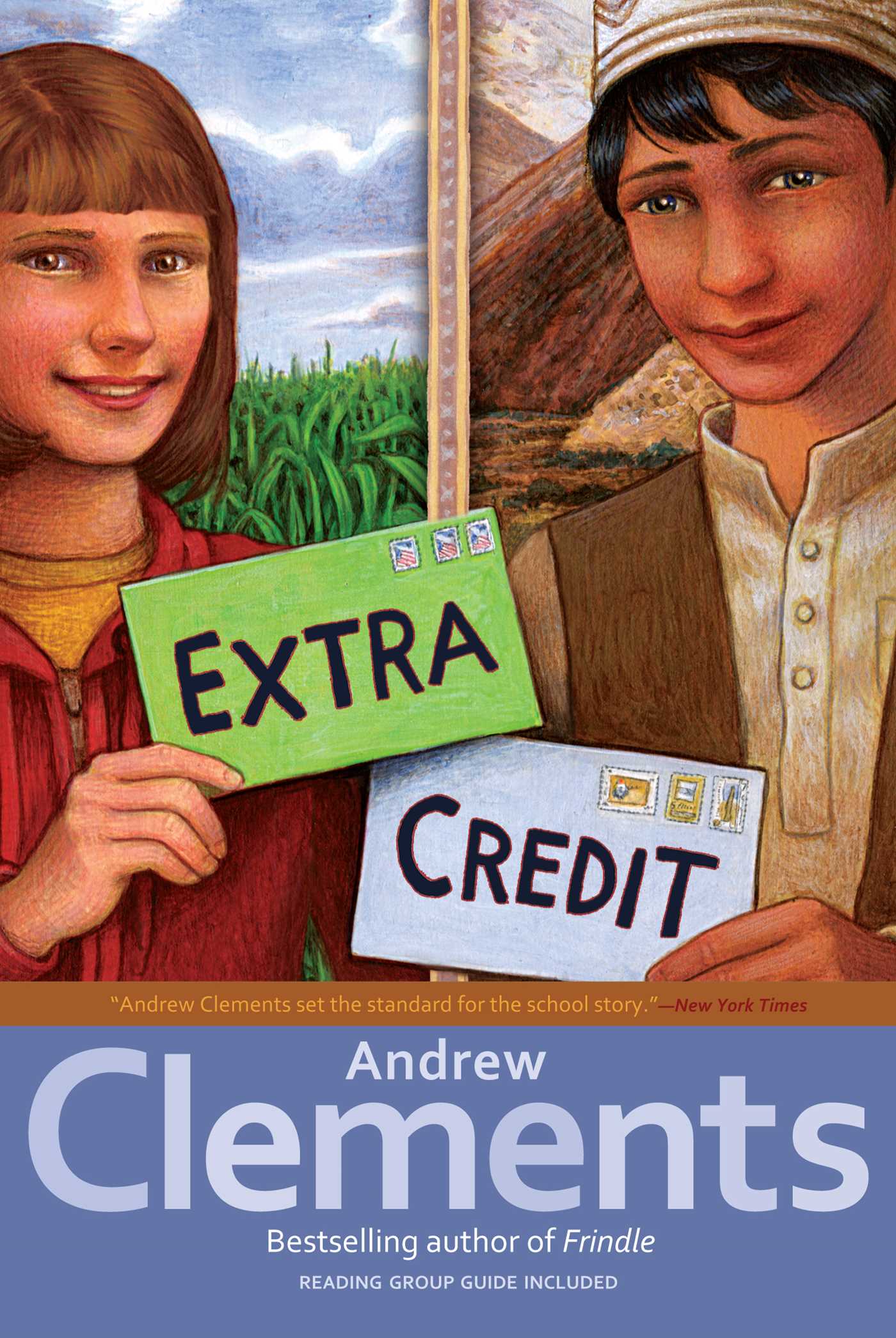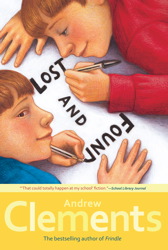Get our latest staff recommendations, classroom reading guides and discover assets for your stores and social media channels. Receive the Children’s Bookseller newsletter to your inbox when you sign up, plus more from Simon & Schuster.If you are an independent bookseller in the U.S. and would like to be added to our independent bookseller newsletter, please email indies@simonandschuster.com
Table of Contents
About The Book
Reading Group Guide
Join our mailing list! Get our latest staff recommendations, classroom reading guides and discover assets for your stores and social media channels. Receive the Children’s Bookseller newsletter to your inbox when you sign up, plus more from Simon & Schuster.If you are an independent bookseller in the U.S. and would like to be added to our independent bookseller newsletter, please email indies@simonandschuster.com
by Andrew Clements
About the Book
It isn't that Abby Carson can't do her schoolwork; it's just that she doesn't like doing it. And that means she's pretty much failing sixth grade. When a warning letter is sent home, Abby realizes that all her slacking off could cause her to be held back—for real! Unless she wants to repeat the sixth grade, she'll have to meet some specific conditions, including taking on an extra-credit project: find a pen pal in a foreign country. Abby's first letter arrives at a small school in Afghanistan, and Sadeed Bayat is chosen to be her pen pal . . . Well, kind of. He is the best writer, but he is also a boy, and in his village it is not appropriate for a boy to correspond with a girl. So his younger sister dictates and signs the letter. Until Sadeed decides what his sister is telling Abby isn't what he'd like Abby to know . . .
Discussion Topics
• Author Andrew Clements chose the state of Illinois in the United States and Afghanistan as the settings in Extra Credit. Why do you think Clements selected these locations? What kinds of differences between the two countries—cultural and otherwise—can you identify after reading the book?
• On the first page of Extra Credit, Afghani student Sadeed thinks that his teacher is going to “recommend him for a special honor,” but when he finds out that his teacher wants him to help write letters to a girl in America, he is very disappointed. Nevertheless, how does this letter writing eventually turn into a “special honor” for Sadeed?
• The character of Abby is introduced in the story when she is climbing a rock wall in her school’s gym. Are you surprised to find out that Abby is struggling in school after reading about her abilities on the rock wall? Despite her grades, do you believe that Abby is actually very smart? Why or why not?
• As a class, have a discussion about Abby and Sadeed. Do Abby and Sadeed have similar personalities? Also, compare and contrast their everyday lives by talking about the following: their homes, their schools, their teachers and their parents. How are they alike and how are they different?
• As pen pals, Abby, Sadeed, and Sadeed’s sister Amira communicate the old fashioned way—by sending letters to each other in the mail. Why is this their only method of staying in touch? What are some conveniences Abby and her friends have in the U.S. that Sadeed and Amira do not have in Afghanistan?
• The rock wall at Abby’s school in Illinois and the mountains of Afghanistan are symbols in Extra Credit—they stand for something else. What do they represent?
• Abby learns from Amira and Sadeed’s letters that not all of the girls in their Afghanistan village are allowed to go to school. Amira is glad that her father “permits” her to go to school. How did this make you feel when you read this?
• The connection between brothers and sisters is explored in Extra Credit. How is Sadeed’s relationship with Amira different from Abby’s relationship with her brother Tom?
• In the novel, Sadeed writes to Abby that he only has one book in his home, and that his teacher has taken a chance by allowing him to read books that are not approved by the Ministry of Education in Afghanistan. What did you think about this?
• Discuss how a writer uses “foreshadowing” in a book. How does Clements use foreshadowing throughout Extra Credit? Identify parts of the story where foreshadowing is present.
• While reading this book, we learn that Abby and Sadeed are taking risks by communicating with one another. Why do you think Sadeed decides to correspond with Abby when he knows that it is forbidden? Do you think Abby realizes that her letters to Sadeed would create controversy at home and in Afghanistan?
• When Abby gives her oral report on her project at the end of the book, her classmates look bored and uninterested. Imagine you are a student in Abby’s class. Would you feel the same way about her report? Why or why not?
• Abby is reluctant to do her extra credit assignment at first. But how was the project actually a good thing for her in the end?
• By the end of the story, Abby and Sadeed have a greater understanding of each other’s lives and cultures. After finishing the book, talk about what else you think Abby and Sadeed learned from exchanging letters.
Activities and Research
• How much did your students know about the country of Afghanistan before reading Extra Credit? Find out more about this country. Research the history of Afghanistan, and talk about present-day life in this country. What problems does the country face today?
• Start your own “Project Pen Pal” in your classroom! Encourage your students to find and communicate with their own pen pals. Conduct research on the Internet to find organizations that supply pen pal names and information. Then, after a few months of correspondence, create a bulletin board similar to Abby’s. Display pen pal letters and other information from your class’s new friends.
• Talk about the significance of the small rock Sadeed sends to Abby from Afghanistan, and the dirt Abby sends from Illinois to Afghanistan. If your students had a pen pal in another country, what would they send to them to represent your hometown? Have everyone bring this item into school. It will be interesting to see if everyone brings in the same thing—or not!
• Extra Credit is a book that celebrates the power of friendship. Have your students make a list of other books they have enjoyed that celebrate friendship, and share these lists with the class.
• What would it be like to be a character in Extra Credit? Ask your students to imagine if they had the power to jump into this book. Would they be a friend of Abby, Sadeed, or someone else? Why?
• Read Arnold Lobel’s story Frog and Toad Are Friends with your students. After reading the story, ask you students why they think Clements chose this book to highlight in Extra Credit. Who in your class can identify more with Frog? And who is more like Toad?
• Continue the story in Extra Credit after the book ends. Have your students write about what they think happens to Abby and Sadeed. Do Abby and Sadeed get back in touch again? Do they ever meet? What does the future hold for Abby and Sadeed? Compare and contrast everyone’s thoughts.
This reading group guide has been provided by Simon & Schuster for classroom, library, and reading group use. It may be reproduced in its entirety or excerpted for these purposes.
About The Illustrator
Mark Elliott has a BFA in illustration from the School of Visual Arts. He has illustrated a number of book covers, and his work has been exhibited at the Society of Illustrators and the Art Directors Guild. Mark lives on a sheep farm in the Hudson Valley region of New York.
Product Details
- Publisher: Atheneum Books for Young Readers (March 13, 2012)
- Length: 224 pages
- ISBN13: 9781416995203
- Grades: 3 - 7
- Ages: 8 - 12
- Lexile ® 830L The Lexile reading levels have been certified by the Lexile developer, MetaMetrics®
Browse Related Books
Awards and Honors
- ILA/CBC Children's Choices
- Kentucky Bluegrass Award Master List
- South Carolina Picture Book Award Nominee
- Iowa Children's Choice Award Nominee
- CBC/NCSS Notable Social Studies Trade Book
- William Allen White Children's Book Award Reading List (KS)
- Christopher Award
- Louisiana Young Readers' Choice Award Nominee
- Booklinks Lasting Connections
- Grand Canyon Reader Award Nominee (AZ)
- Beehive Award Master List (UT)
- Nutmeg Book Award Nominee (CT)
- Parents' Choice Award
- Rebecca Caudill Young Readers' Book Award Master List (IL)
- Volunteer State Book Award Nominee (TN)
- Land of Enchantment RoadRunner Award Nominee (NM)
- Golden Sower Award Nominee (NE)
- Sunshine State Young Readers' Award List (FL)
- Charlie May Simon Children's Book Award Nominee (AR)
- Georgia Children's Book Award Finalist
- Crown Award Nominee (TX)
- Book Links Good Books Of The Year
- Bluestem Book Award Master List (IL)
- Bank Street Best Books of the Year - with Outstanding Merit
- Parent's Choice Award Recommended
- Cleveland Public Library Celebrate With Books Selection
- Louisiana Young Readers' Choice Award
Resources and Downloads
High Resolution Images
- Book Cover Image (jpg): Extra Credit eBook 9781416995203
- Author Photo (jpg): Andrew Clements Photo Credit:(0.1 MB)
Any use of an author photo must include its respective photo credit























